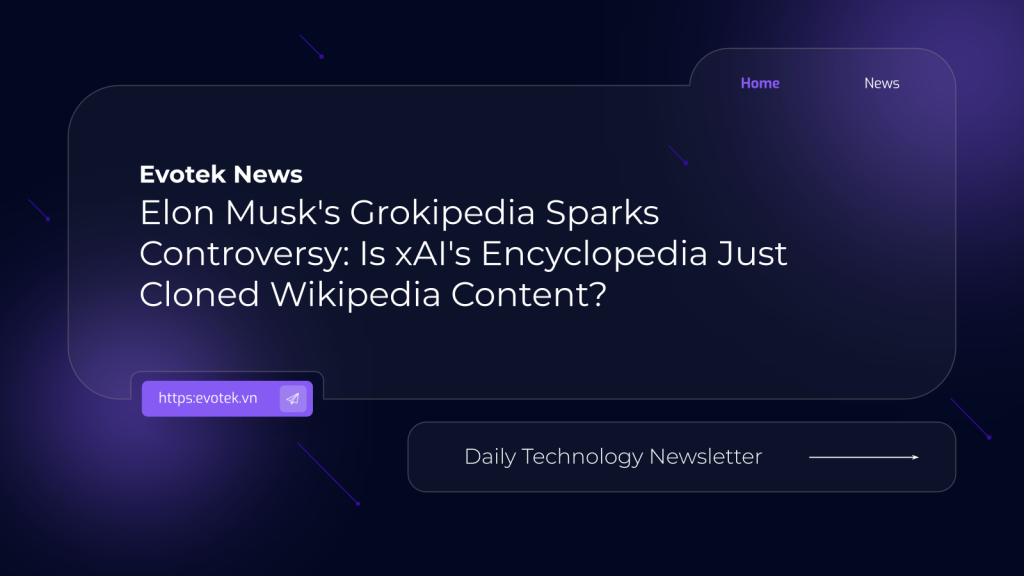Elon Musk’s xAI has officially launched Grokipedia, an ambitious new online encyclopedia intended to rival the long-established Wikipedia. However, its debut is already overshadowed by significant controversy, as numerous pages appear to directly copy content from its predecessor, raising serious questions about originality and the nature of AI-driven content generation.
Grokipedia’s Initial Appearance and Features
Upon its launch, Grokipedia presents a minimalist design that closely mirrors Wikipedia. The homepage predominantly features a large search bar, and individual entries are structured with familiar headings, subheadings, and citations. A notable absence on the site is the lack of any photos within articles.
Unlike Wikipedia’s collaborative model, Grokipedia’s user editing capabilities seem either limited or entirely absent. While an “edit” button occasionally appears, clicking it only reveals pre-existing changes without specifying who made them or allowing users to propose their own modifications.
The Dilemma of AI “Fact-Checking”
Grokipedia claims that its articles are “fact-checked” by Grok, xAI’s artificial intelligence. This assertion immediately invites skepticism, especially considering that large language models (LLMs) are notoriously prone to “hallucinating” or generating inaccurate information. The platform even specifies how long ago these AI fact-checks were performed, adding another layer to the ongoing debate about AI reliability and truthfulness.
Direct Content Adaptation: A Deeper Look
Despite Elon Musk’s previous promises that Grokipedia would be a “massive improvement” over Wikipedia, evidence suggests a heavy reliance on Wikipedia’s existing knowledge base. Many pages, including those for popular items like the MacBook Air, PlayStation 5, and the Lincoln Mark VIII, explicitly display a disclaimer at the bottom: “The content is adapted from Wikipedia, licensed under Creative Commons Attribution-ShareAlike 4.0 License.”
However, this “adaptation” frequently extends beyond a simple rewrite, with several documented cases revealing near word-for-word, line-for-line duplication of content directly from Wikipedia entries.
Wikimedia Foundation Responds to the Allegations
The Wikimedia Foundation, the nonprofit organization behind Wikipedia, has voiced its concerns regarding Grokipedia’s content. Lauren Dickinson, a spokesperson for the foundation, stated pointedly, “Even Grokipedia needs Wikipedia to exist,” emphasizing Wikipedia’s fundamental role as a source of online knowledge. This incident is not the first time xAI has faced scrutiny over Wikipedia citations; last month, Musk acknowledged Grok’s reliance on Wikipedia and indicated plans to address it by the end of the year.
Divergent Perspectives: The Climate Change Example
While some Grokipedia articles closely mirror Wikipedia, others, particularly on controversial topics, exhibit significant differences in their presentation. For instance, Wikipedia’s page on climate change highlights a “nearly unanimous scientific consensus that the climate is warming and that this is caused by human activities.”
Grokipedia’s entry, conversely, offers a more critical perspective. It suggests that claims of unanimous scientific agreement “overstate agreement due to selective categorization in literature reviews” and implies that media and advocacy organizations like Greenpeace contribute to “heightened public alarm” without always grounding their claims in “proportionate empirical evidence.”
Scale, Version, and Wikipedia’s Enduring Strengths
Currently, Grokipedia boasts over 885,000 articles. While a substantial number, it remains a fraction of Wikipedia’s approximately 7 million English-language pages. Operating under a “v0.1” designation on its homepage, Grokipedia is clearly an early iteration of xAI’s ambitious project.
The Wikimedia Foundation continues to underscore Wikipedia’s unique position as a nonprofit, ad-free, and data-selling-free platform. Its enduring strengths lie in transparent policies, rigorous volunteer oversight, and a commitment to neutrality, all built upon human-created, openly collaborative knowledge. As Wikipedia approaches its 25th anniversary, it reaffirms its mission to provide free, trustworthy knowledge cultivated by its dedicated global community, distinguishing itself markedly from for-profit alternatives.

 日本語
日本語 한국어
한국어 Tiếng Việt
Tiếng Việt 简体中文
简体中文